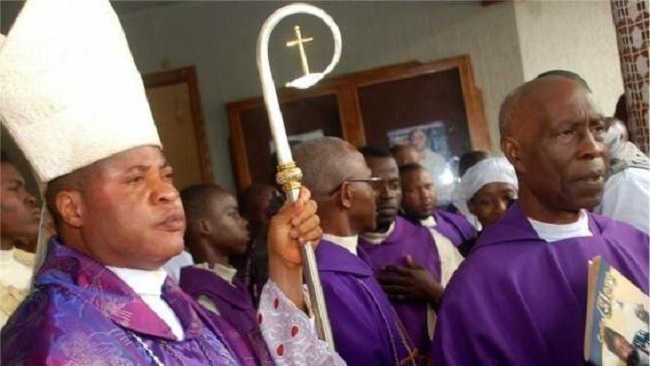Polarizing Nigerian bishop backed by the Holy Father steps down
An embattled bishop who has not been able to set foot in his diocese in Nigeria for over five years has resigned his position, saying it is “no longer beneficial to the Church” for him to hold his position, just over eight months after Pope Francis threatened to suspend any priest who refused to accept him.
Bishop Peter Ebere Okpaleke was appointed to the Diocese of Ahiara in southern Nigeria by Pope Benedict in 2012.
A statement from the Congregation for the Evangelization of Peoples on Monday said Francis has thanked Okpaleke for his “love for the Church.”
“I have taken this step also for the good of all the faithful of Ahiara Diocese, especially those that have remained faithful in a local Church being controlled by some priests,” Okpaleke said in his resignation letter.
The Diocese of Ahiara is one of the most Catholic in the nation, with about 400,000 Catholics out of a total population of a half-million. It also has numerous vocations to the priesthood and religious life.
The Ahiara clergy rejected Okpaleke, a member of the southeastern Igbo tribe, claiming the local Mbaise people were being sidelined when it comes to the appointment of bishops.
By choosing a man for a different diocese to lead the southern Ahiara, the Vatican was upholding a long-standing tradition in Africa of not allowing choices for bishops to be defined by tribal affiliations.
Since the standoff began, there have been no priestly ordinations, even though an estimated 50 seminarians finished their studies in recent years. There have been no confirmations nor Holy Thursday masses, and the life of the diocese has been dominated by the conflict.
Francis tried to settle the crisis last summer, when on June 8, he issued a seemingly unprecedented threat, giving the priests of the diocese a 30-day deadline: Either write to him promising “total obedience,” or face suspension.
Most of the members of the clergy complied with his demand, but according to Monday’s statement from the Congregation for the Evangelization of Peoples, the letters of obedience often pointed out “their psychological difficulty in collaborating with the bishop after years of conflict.”
“Taking into account their repentance, the Holy Father decided not to proceed with the canonical sanctions and instructed the Congregation for the Evangelization of Peoples to respond to each of them,” the statement continued. “In this line, the Congregation has urged every priest to reflect on the grave damage inflicted on the Church of Christ and expressed hope that in the future they will never again repeat such unreasonable actions opposing a Bishop legitimately appointed by the Supreme Pontiff.”
On Dec. 1, Bishop Joseph Danlami Bagobiri, of Kafanchan, in Kaduna State, wrote a statement in which he urged relevant authorities to “give Ahiara a bishop close to their hearts” – suggesting the pope replace Okapaleke with a bishop the clergy will accept.
Bagobiri’s position was at odds with most of the other bishops of Nigeria, who said the precedent of forcing the pope’s hand would tempt other dioceses to revolt against their shepherds.
“That’s especially dangerous in a place like Nigeria, where we have so many differences of tribal positions and so on,” Cardinal John Onaiyekan – archbishop of the Nigerian capital Abuja – told Crux in January. “We believe that we have a system where the pope appoints, and whether you like it or not, you accept [the bishop] and then you leave him to work. He works well or he doesn’t, and that’s the story of the Church.”
For a period, the cardinal was the apostolic administrator of the Diocese of Ahiara.
At the time, Onaiyekan warned: “It won’t stop here.”
“It’s not only about new bishops, but those who are already bishops. If somebody can create enough problems in such a way that you can no longer rely on his stable episcopacy, then you can force the pope’s hand,” the cardinal said.
Despite these concerns, Okpaleke said his resignation was the best course of action for the people of the diocese.
“I consider my resignation from the position of Bishop of Ahiara as the only proper option now to facilitate re-evangelization of the faithful and, most importantly and urgently, the priests of Ahiara Diocese, especially now that the Holy Father and his collaborators in the Roman Curia can already decipher priests who affirmed their loyalty to the Holy Father and those who decided to bow out of the Catholic Church in disobedience,” the bishop said.
“I invite any dissenting priests to re-examine their initial motivations for becoming priests in the Catholic Church. Repentance and reconciliation are urgent,” Okpaleke said.
The bishop also spoke of the personal cost the drawn-out drama had had on him, saying “this has been threatening my spiritual life.”
“Exercising the ministry in a diocese where priests who are supposed to be my immediate and closest collaborators, brothers, friends, and sons are at war with one another, with the laity and with me as their chief shepherd would be disastrous and a threat to salvation of souls – including my own soul,” Okpaleke said.
For the moment, Ahiara doesn’t have a new bishop: According to the Vatican statement, “for the time being, the Holy Father does not intend to appoint a new bishop” and has instead named Bishop Lucius Iwejuru Ugorji of Umuahia, 20 miles away, the new apostolic administrator.
Ugorji will have full faculties, and the statement says Francis has a “special and particular” concern for Ahiara, and “hopes … the local Church will recover its vitality and never again suffer such actions that so wound the Body of Christ.”
Source: Crux Now




